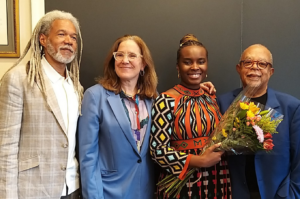
The seventh volume of the Cambridge Journal of Postcolonial Literary Inquiry features scholarly essays about Black Panther directed by Ryan Coogler.
Following its 2018 release, Black Panther became the highest grossing film by a Black director and the ninth highest grossing film of all time. Seemingly overnight, elite athletes and fans around the world began performing the Wakanda Forever Salute and the term “Afrofuturism” was circulating in mainstream news outlets.
The Black Panther issue of the Cambridge Journal of Postcolonial Literary Inquiry features scholarly critique of the themes and theories that lie beneath the film’s cultural hype: the history of slavery, decolonization, civil rights, freedom, sovereignty, and the aesthetics of Blackness.
In his introductory essay, Professor of English at Ohio State University, Adélékè Adéẹ̀kọ́ reflects:
In different degrees of emphasis, each article attempts to clarify the film’s handling of the conflicts of dominion—individual and collective—and how these relate to the exercise of freedom. Although it was never colonized, Wakanda’s fate is inextricable from powerful currents of global relations and power-filled institutions whose rationalities were consecrated within slavery and colonization. For catching these enabling contradictions so arrestingly, Black Panther’s narrative sweetness bred the worldwide fever that attended its reception.
The Cambridge Journal of Postcolonial Literary Inquiry is edited by Ato Quayson, Professor of English at Stanford University. The peer-reviewed journal features the latest research on postcolonial literary history and criticism from scholars around the world.
List of Articles
“Fifty Shades of Blackness: Recovering an Aesthetics of the Afrifuge” by Dilip Menon
“Alegropolis: Wakanda and Black Panther’s Hall of Mirrors” by Ananya Jahanara Kabir
“Postcolonial Critique in Ryan Coogler’s Black Panther” by Adélékè Adéẹ̀kọ́
“Embodied Masculine Sovereignty, Reimagined Femininity: Implications of a Soyinkaesque Reading of Ryan Coogler’s Black Panther” by Tolulope Akinwole
“The Seeds of Destruction: Naturalism, Hysteria, and the Beautiful Soul in Lewis Nkosi’s Mating Birds” by Eric D. Smith
“Plaided or Dusky Forms: Highland Landscape in Scotland and Kenya” by M. Mahavir Kumar
“The Message It Is Not: The Work of the Medium Known as Documentary” by Rey Chow
“Good Intentions” by Ragini Tharoor Srinivasan
“On Nature Programming, the Anthropocene, and the Humanitarian Impulse in Documentary” by Lucas Hilderbrand
“Giving the Microphone to the Other” by Naomi Waltham-Smith
“Bad Habits, or, Can Reflexivity Be Good Again?” by Pooja Rangan
Click here to read the full issue!









COMMENTS -
Reader Interactions